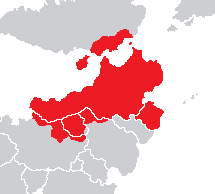User:Britbong64/Sandbox 4: Difference between revisions
Jump to navigation
Jump to search
Britbong64 (talk | contribs) No edit summary |
Britbong64 (talk | contribs) No edit summary |
||
| Line 5: | Line 5: | ||
|era = Middle Ages<br/>Early modern period | |era = Middle Ages<br/>Early modern period | ||
|status = Empire | |status = Empire | ||
|government_type = {{wp|Confederal}} {{wp|elective monarchy}} | |government_type = {{wp|Confederal}} {{wp|elective monarchy}} (1027-1674)<br>{{wp|Confederal}} {{wp|absolute monarchy}} (1674-1785)<br>{{wp|Confederal}} {{wp|constitutional monarchy}} (1785-1786) | ||
|life_span = 1027-1786 | |life_span = 1027-1786 | ||
|year_start = 1027 | |year_start = 1027 | ||
| Line 44: | Line 44: | ||
|capital = No single/fixed capital (1027-1640)<br>Westbrücken (1640-1786) ''de jure''<br>Wiesstadt (1640-1786) ''de facto'' | |capital = No single/fixed capital (1027-1640)<br>Westbrücken (1640-1786) ''de jure''<br>Wiesstadt (1640-1786) ''de facto'' | ||
|royal_anthem = {{wp|Gott erhalte Franz den Kaiser|Gott erhalte, Gott beschütze<br><small>God preserve, God protect</small>}}<br>[[File:MediaPlayer.png|link=https://www.youtube.com/watch?v=97LxreUD_Oo|200px]] | |royal_anthem = {{wp|Gott erhalte Franz den Kaiser|Gott erhalte, Gott beschütze<br><small>God preserve, God protect</small>}}<br>[[File:MediaPlayer.png|link=https://www.youtube.com/watch?v=97LxreUD_Oo|200px]] | ||
|common_languages = | |common_languages = '''Official:'''<br/>{{wp|German language|Weranian}} and {{wp|Medieval Latin|Medieval Solarian}} | ||
|religion = Catholicism | {{hidden |style=font-size:100%;padding:0.25em 0 0; |headerstyle=text-align:left;font-weight:normal; | ||
|header = '''Regional:''' | |||
|content = {{unbulleted list|{{Wp|Low German|Aldman}} | [[Azmaran language|Azmaran]] | [[Borish language|Borish]] | {{Wp|Frisian language|Dellish}} | {{wp|Estonian language|Kirenian}} | {{wp|Danish language|Mescon}} | {{wp|Lithuanian language|Ruttish}} | {{Wp|Anglish|Swathish}} }}}} | |||
|religion = '''Official:'''<br/>[[Solarian Catholic Church|Catholicism]] (1106-1607) | |||
{{hidden |style=font-size:100%;padding:0.25em 0 0; |headerstyle=text-align:left;font-weight:normal; | |||
|header = '''Minority:''' | |||
|content = {{unbulleted list| {{wp|Amendism|Protestantism}} | {{wp|Germanic paganism|Weranic paganism}} | {{wp|Lithuanian mythology|Ruttish paganism}} }}}} | |||
|currency = | |currency = | ||
|demonym = | |demonym = | ||
|legislature =Tagsatzung | |legislature = Tagsatzung | ||
|leader1 = [[Rudolf I, Rudolphine Emperor|Rudolf I]] | |leader1 = [[Rudolf I, Rudolphine Emperor|Rudolf I]] | ||
|leader2 = [[Leopold III, Rudolphine Emperor|Leopold III]] | |leader2 = [[Leopold III, Rudolphine Emperor|Leopold III]] | ||
Revision as of 11:27, 8 August 2021
Rudolphine Confederation Eidgenossenschaft | |||||||
|---|---|---|---|---|---|---|---|
| 1027-1786 | |||||||
| Royal Seal | |||||||
 The Rudolphine Confederation at its greatest extent prior to the Amendist Wars in 1582. | |||||||
| Capital | No single/fixed capital (1027-1640) Westbrücken (1640-1786) de jure Wiesstadt (1640-1786) de facto | ||||||
| Common languages | Official: Weranian and Medieval Solarian | ||||||
| Religion | Official: Catholicism (1106-1607) | ||||||
| Government | Confederal elective monarchy (1027-1674) Confederal absolute monarchy (1674-1785) Confederal constitutional monarchy (1785-1786) | ||||||
| Rudolphine Emperor | |||||||
• 1027-1051 (first) | Rudolf I | ||||||
• 1764-1785 (last) | Leopold III | ||||||
| Legislature | Tagsatzung | ||||||
| Historical era | Middle Ages Early modern period | ||||||
• Established | 1027 | ||||||
• Disestablished | 1786 | ||||||
| |||||||
History
- Founded in 1027 after King Rudolf led the Eidgenossenschaft (oath-fellowship) against the Verliquoians/Estmerish preventing their expansion into northern Euclea, in particular Borland. Rudolf was crowned as the Leader of the Eidgenossenschaft, commonly known as Emperor of the Rudolphine Confederation by Verliquoians.
- Initially the Confederation was mostly pagan being partly founded on entrenching pagan exceptionalism in northern Euclea. However there existed Sotirian communities with the imperial authority not *per se* repudiating Sotirianity.
- In 1106 Emperor Rudolf III converted to Sotirianity and begun a campaign of eradicating paganism in the confederation.
- Following Rudolf III's conversion the confederation gain papal permission to go on crusades - Ruttland, Alsland(?), Kirenia(?), Bonnlitz, Scovern(?), Caldia over the next half century
- Rivalry with the Third North Sea Empire in Caldia-Scovern and Maritime Guild in Kirenia.
- Reaches maximum extent prior to the Amendist wars.
- Amendist Wars leads to civil war in the Confederation and many of its members to leave the authority of the Emperor.
- Decline during the 17th century. This was accompanied by a centralisation of power by the imperial house starting under Otto IX (1646-1695) abolishing many of the rights of the monarchies concentrating power in the hands of the imperial house.
- Ten Years' War leads to the further destruction of the Confederation.
- Following the Ten Years' War the confederation continues centralising; this causes further discontent.
- 1785 - revolution creates a constitutional regime, which then becomes a republic a year later.
Politics
- Kinda a mix between the Old Swiss Confederation and Holy Roman Empire.
- Originally founded - basically when the Emperor requests troops to fight in a war, the constituent states send a levy. Most wars within the confederation are crusades against pagans(?) or against external threats. The central state also demands some taxes, but aside from that member states are basically autonomous.
- Following the Amendist Wars the Federal Diet (Tagsatzung) is founded, which consists of representatives sent from the states. This leads to increased conflict between the emperor and the Tagsatzung.
- In 1652 Emperor Otto IX revokes many noble privileges including the marginalisation of the Tagsatzung heralding the start of absolutism in the confederation.
- Following the Ten Years' War far more centralisation is pursued - more taxes, more authority to the church, less respect for ancient privileges. Tagsatzung increasingly marginalised in favour of absolutism.

